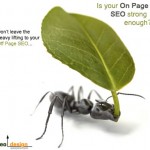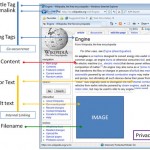If you optimize websites or are in the process of doing so, there is something you should be aware of. Just because your website is in a particular position today does not mean that your sites rankings are stuck in that position. Rankings have the ability to move up or down based on the on-page or off-page criteria that affect relevance of the page.
Criteria such as back links (who links to you and if the website has authority or not), competition, changes to the pages such as titles, hyper links, navigation, or internal links in the site or a simple modification to the description for example, can all affect the outcome. Learning how each and every facet of these type of modifications either (a) reward your efforts or (b) diminishes the effectiveness, in your quest for the top 10, is the basis of search engine optimization.
To come straight out of the box and state that “he or she with the most links to their website from the right sources” can make a website rankings fluid, is in many ways the case, however a more diplomatic approach might suggest actually explaining why this phenomenon is one of the most vital rankings components in hitting the coveted top 10.
Regardless of where your website was, your sight can climb like a monkey on a mission heading for the banana at the top of the tree. Instead of thinking from the perspective of old school algorithms where you are #21 for a keyword and that’s the way it is, employing some of all of the tactics touched upon briefly below (along with tactful link building) can give your site the ability to become fluid and achieve higher heights in a matter of days or weeks if done properly.
Consideration of on page factors (creating the beacon for search engines):
Things like keyword stuffing diffuses the quality of your pages, although many search engines do not even consider the keywords you choose in your meta tags, they rely on interpretation of the information through latent semantic indexing (essentially if you put the word affordable in the document for example 10 times in conjunction with another relative keyword it will associate the two and interpret a meaning and rank your site for the terms accordingly).
It is through this process of semantically identifying the content on your pages (word stemming and contextual word association) that qualifiers and keywords communicate to web spiders that in turn define the content of your pages. So, what is important is that all of them work together holistically in order to create the right footprint for indexing. If you have a website based on green widgets and you have the term green widgets in the title, in the description and in the body text of your document for example at the beginning, in the middle and at the end of the page, not to mention sub folders leading to blue widgets, purple widgets, etc. with hyper links to tie it all together systematically. Such an example would be considered a themed site. This alone can produce substantial results based on the way you structure your links and use the titles and descriptions and falls under the classification of on page SEO.
Aside from that, things like having a privacy policy, a site map, a phone number and physical street address also play a part in tightening up your on page SEO and can dramatically enhance your upward potential in search engines. Having covered the basics (your pages all have unique titles, descriptions, the pages are themed and have a focus) you are now ready to consider the off page factors that can enhance your positioning.
Off Page SEO (targeting and execution):
Off page SEO is where the real magic happens. No amount of one page SEO (*in my opinion) is going to take you all the way to the top 10. Unless that is, you happen to be in such a specialized industry that you have virtually have no competition, which is highly unlikely online. So, ensuring that you have covered your bases and are ready to embark on the website promotion and link building route, here are a few things to consider.
Search engines like Google like keyword rich anchor text (call them juicy links or whatever you like), in fact, this is one of the most dominant components to ranking well across the board for meta based search engines such as Meta Crawler, Dog Pile, Google and the like. So, if you have links on your internal pages, for God’s sake, do use words like “click here” or “view more information” unless that’s what you want to rank for. In the same context, for off page link building, you want to mix it up a bit as well, sometimes using the domain name as a link, the main keywords, reversed, next to qualifiers (affordable, professional, company, services, etc.) and vary the titles and pages you point the links at on your website.
All of this is elementary link building 101, but sometimes it’s the simpler things that are over looked as they are typically the most effective. Here is a tactic for example. Say you want to rank for a term, but have no idea how competitive it is. Use Google and put the term in quotes “my desired keywords”, and then hit return. Once you do you can see how many other pages are competing for those terms by the number returned by the search engine. For example results 1 of 10 of 400,000 results.
Although this is off the record and tied into page rank to some degree (just for the sake of gauging your websites link popularity), if you have a page rank of 0-2 your better off building links for things under 50,000 results, although this is not always the case some PR 2 sites for example can acquire terms as high as 600,000 results using the exact match quotes search operator, but better to play it safe.
If you want a term that has more than a million competing pages for example, you had better start chipping away at it with the understanding that the on page and off page SEO tactics you use, will have to be better than the other 999,000 sites out there, who may or may not be using some form of the strategies you are for procuring a ranking for that term. Article marketing, link building and social bookmarking in tandem are excellent solutions for this dilemma and if orchestrated properly can strategically chip away at high ranking terms with stunning daily search volumes with a unified goal in mind.
Based on how popular your website is, if it has any of the keywords in the domain name, or how well your internal links are optimized you may already in fact have inroads targeting those terms. Ideally you should start with phrases within reach of your current websites’ ranking potential. New websites should be focused on building links for at least 4-6 months if they are going to be taken seriously from major search engines. In this way, the idea is to blanket the market with terms used to find products or services from those categories. Using a keyword research tool is great, but sometimes when optimizing exact phrases, common sense can assist you in coming up with variations on a theme.
Mix it up with your link building & off page SEO:
For example, building 500 links to a site all using the same anchor text is essentially like pinning a target on your back with a big bullseye screaming please kick me from search engines. Sure they will kick you, not up in the rankings, but out of the index for gaming the system. So, choosing a steady base of terms that all pertain to the industry and using all types of variations in spelling, singular, plural, reversed chronological order, etc. assists the process when all of the keywords start to tally up and impact your websites global (internal / external) link profile.
Add a Blog to your site or make the site a custom word press blog / theme with navigation.
If you have done your homework, something as simple as adding a word press blog / content management system which internally links your content, uses the h1 tag (your headline) as the post title of the blog / page you create and allows you to insert tags (which are considered anchor text, ahem, ahem) is accomplishing the points covered above in reference to old school SEO. Using this tactic, you have on topic themed pages, titles and tags with the keywords you want to rank for in the midst of the content, not to mention that each time you publish a post it pings the bots to visit your site and index your content.
There is always more to consider and by no means is there ever a one and done tactic for achieving long lasting search engine results. A constant vigil is required and an aptitude of systematically removing the elements that could obstruct the ascension process in combination with emphasis on refreshing your content or adding new pages to assist in vying for the attention of the web spiders & bots. The more pages you have indexed, the greater potential for link popularity. So building a steady flow of fresh links, tweaking the internal links on your pages, changing titles and descriptions from time to time to add new keywords to your websites digital snapshot counterpart that has a history of every time your pages have been indexed (and what the main keywords were) are all slight variables that nudge one up in the rankings when implemented properly.
Then sometimes, you come across a term that for lack of better terms is simply stubborn, you optimize your pages to the inth degree, your links say your in the top ten when you use the quotes and all in anchor test, but for the love of god your rankings are still not climbing. This is usually a result of link aging (they may be either to premature to pass value, or you simply haven’t reach critical mass to overcome the barrier to entry from other’s link building efforts holding you at bay. The solution, vary your links incorporating the main keywords used contextually with a wider variance of qualifiers, try a less competitive variation of the keyword and wait for the breakthrough.
All optimization efforts are not noticeable quickly. Sometimes having an universal elevation in website authority across data centers takes time to synchronize such as the score that was accessed by search engines for your site (Before SEO) to it’s current (optimized) state need to move all of the old pages and references out before assessing a new base level. In any case, sometimes patience is the key and you are better off not losing sleep over it, just keep searching for anomalies and more than likely you will find out what the problem is.
Things like duplicate content from your site not having an htaccess file, lack of a proper robots.txt file, a bad egg on a shared IP address where you host your site or some minuscule detail could be preventing you from hitting your mark.










